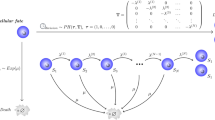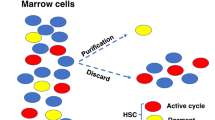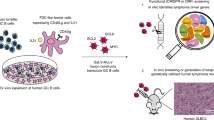Abstract
A method is described that permits colony formation in culture by B lymphocytes from normal blood and from blood, marrow or lymph nodes of patients with myeloma or lymphoma. The method depends on: (1) exhaustively depleting cell suspensions of T lymphocytes, (2) a medium conditioned by T lymphocytes in the presence of phytohaemagglutinin (PHA-TCM), and (3) irradiated autologous or homologous T lymphocytes. Under these conditions the assay is linear. Cellular development of B lymphocytes can be followed, differentiation to plasma cells is seen in cultures of cells from normal individuals and myeloma patients, but not lymphoma patients. Malignant B lymphocytes in culture produced immunoglobulin of the class identified in the patient's blood, or in freshly obtained cells. We conclude that the assay is suitable for studying the growth, differentiation and regulation of normal and malignant B lymphocytes in culture.
This is a preview of subscription content, access via your institution
Access options
Subscribe to this journal
Receive 24 print issues and online access
$259.00 per year
only $10.79 per issue
Buy this article
- Purchase on Springer Link
- Instant access to full article PDF
Prices may be subject to local taxes which are calculated during checkout
Similar content being viewed by others
Rights and permissions
About this article
Cite this article
Izaguirre, C., Minden, M., Howatson, A. et al. Colony formation by normal and malignant human B-lymphocytes. Br J Cancer 42, 430–437 (1980). https://doi.org/10.1038/bjc.1980.255
Issue Date:
DOI: https://doi.org/10.1038/bjc.1980.255
This article is cited by
-
Stem cells and diversity
Leukemia (2003)
-
Effect of interleukin-2 on the ex vivo growth of human myeloma cells
Cancer Immunology, Immunotherapy (1989)
-
Human B cell colony assays
Blut (1987)
-
Adenosine and deoxyadenosine toxicity in colony assay systems for human T-lymphocytes, B-lymphocytes, and granulocytes
Cancer Chemotherapy and Pharmacology (1982)



